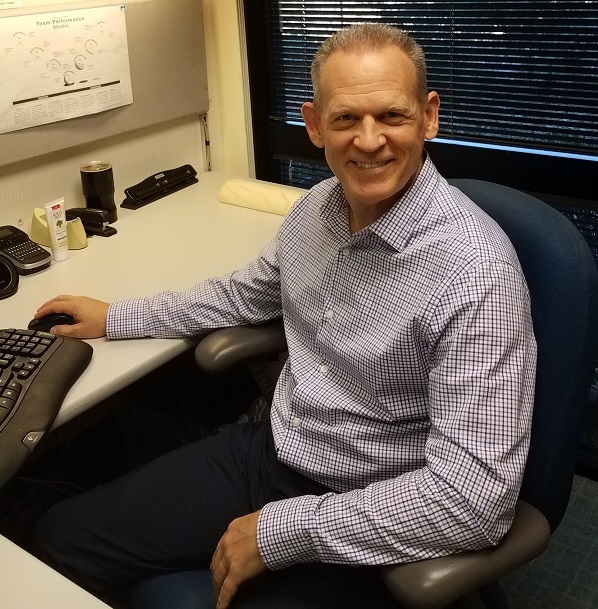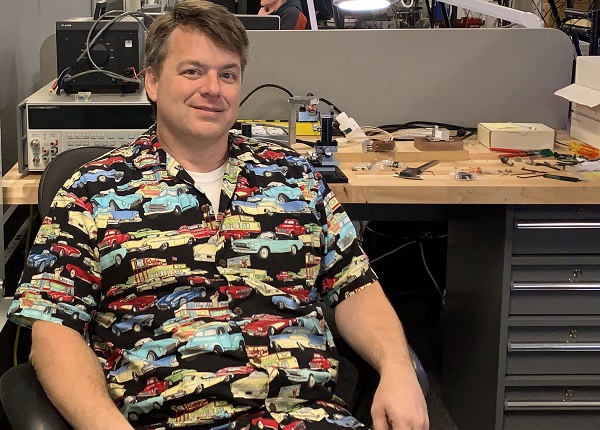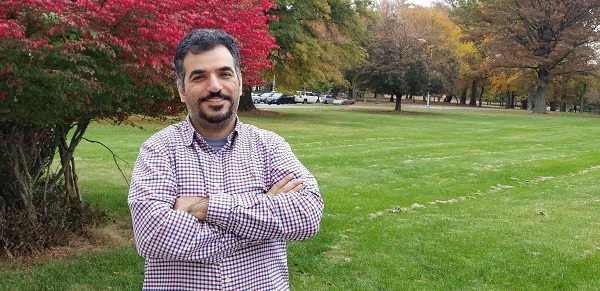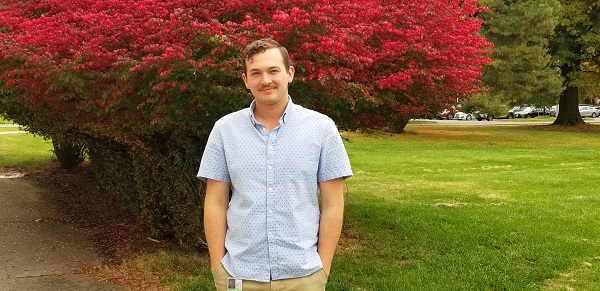- Other Fluke companies:
- Fluke
- Fluke Biomedical
- Fluke Networks
- Fluke Process Instruments
Forward with Fluke Calibration: Robert Haines’ Voyage of Discovery
We’re proud to feature this interview with one of our team members who helps move the world forward with Fluke Calibration. Looking for a calibration product? Call our Customer Care Center at +1 877 355-3225, email us at info@flukecal.com, or request a sales consultation. We’ll connect you with the person who can best help.

Not many people can say this about their job: “It’s been a dream. Honestly, it’s really great to be a part of it, from so many perspectives.” That’s Robert Haines talking. He’s Manager of Technology Development at Fluke Calibration, and a lot of the work his team does must be kept under wraps. Yet his enthusiasm for his work can’t be suppressed.
“I can talk at great length about what we’re doing, but how much of it we put out to the outside world is a bit debatable,” he muses, “It’s going to be an interesting challenge to talk about all the awesome stuff that we’re doing in technology development without talking about the actual stuff.”
What can he tell us? Robert heads a team of three engineers who are dedicated to a variety of technology projects. “I can talk about the general scope of what we are doing, some of the types of work and how we intend to incorporate those sorts of projects into our products.”
Bringing multiple calibration disciplines together
Robert explains the effort to unify multiple calibration disciplines into one coherent organization with the creation of “Fluke Calibration.” “Martin Girard was the president of DH Instruments and he became the general manager of Fluke Precision Measurement. At that time, we were a bunch of acquisitions. There was Fluke, DH Instruments, and Hart Scientific. Later, we added Ruska and Martel Electronics. We were different locations that acted pretty much independently, and his vision was to bring us all together, as Fluke Calibration, a unified organization.“
He continues, “The Tech group is not a part of any one discipline. We’re like a hub. In fact, most of our projects involve all disciplines in one way or another. The work we are doing would not have been possible even a few years ago, because we’ve been building the level of cooperation necessary to do it as a group and as a team within Fluke Calibration, under the leadership of [Engineering Director] Roger Peniche, and under our continuing goal to operate as one coherent company.”
Robert sees the Technology Development team as a natural extension of a unified Fluke Calibration. “I see that as part of the future and strength of Fluke Calibration, that we have a multi-disciplinary, very highly talented team. We can pull together and accomplish things that no one-discipline company could do. We’re taking on projects that require very high levels of skill in multiple areas. I find that very exciting. That’s part of what gets me out of bed in the morning.”

From pressure calibration to technology development
Robert was an integral part of the pressure calibration team in Phoenix for more than 21 years, having worked for DH Instruments prior to its acquisition by Fluke. “My degree is in mechanical engineering and I’ve always loved the full breadth of that discipline. I was one of those people who really dug into and used every subject I studied in school.”
“I’ve had the honor and privilege to be part of every type of product we made in pressure, whether it’s pressure controllers, monitors, primary standards or flow products. I got to use all of my mechanical engineering and later other engineering skills as part of what it takes to make those products work. I had the opportunity to learn a lot about control theory and participate with a very high-performance team in Phoenix. I still get to work and with and consult the Phoenix team sometimes. They're broad-based, talented folks. That’s what it takes to design high-level calibration equipment. You can’t be too narrow and get very far. You have to be able to think outside a tiny box. And they do.”
Before taking on the Technology Development team, Robert managed a global mechanical engineering team before returning to his pressure calibration roots. He “was on the team developing the 4322 Automated Pressure Calibration System and the 8270A and 8370A Modular High Pressure Controller/Calibrators. By the time we were done with those, the Phoenix team had grown a lot. At that time, from the need and desire to create a structure that would support cutting edge breakthrough technology, we created the Technology Development team in August of 2018.”

A challenging learning experience
His new job lets him bring together all of his talents but it’s been a learning experience as well. “One of the things I had to learn, especially when we were looking at pressure sensors, is that even with pressure sensing, that’s not one discipline. You have to combine the mechanical side with the electrical signal processing and analog circuitry side with the software side, and all these things had to happen at once. It’s funny how a sensor might seem simple, but it’s not. What it took to solve some of those problems took some development in a multi-disciplinary way with skills that we didn’t all have but, in particular, I didn’t have.”
“Problems like that required strategies that are really important for technology, where there are always multi-disciplinary challenges involving new or different skills. Those experiences helped pave the way to the type of work we do every day in Technology.”
“It’s challenging work, but it’s really rewarding work. And it’s really interesting. You don’t know how it’s going to turn out when you start. It’s a different kind of work than when you have a serial list of 'do these things'.”
The voyage of discovery
If he doesn’t have a standard “to do” list, how does his team decide what to work on? “We had to develop our own processes because developing technology is not the same as developing a product. You have a lot more unknowns. Usually, you can only see the work necessary to get to the next level. So Level One is technologically feasible; the physics make sense. Level Two is, you have a working prototype. Level Three is, you’ve tested it multiple times in different conditions. And Level Four is, the risk level is low enough that you can transfer it to a new product introduction.”
“You can’t just put together a Gantt chart for technology and say, go do these things. You don’t often know, months from now, the problems you’re going to need to solve. You learn them as you go. It takes a special kind of person to do that work. It takes the willingness to deal with that level of uncertainty.”
Robert’s team is skilled in doing just that. “We get excited about finding the answers and the voyage of discovery. We learn and are doing a pretty good job of not getting frustrated when things don’t go quite the way you want upfront. We try to reinforce that when you try something that doesn’t work out, yes you could call that a failure, but we consider that a learning opportunity. If you learned something from it, that’s a success.”

Game changing performance shifts for Fluke Calibration customers
How does he see his work impacting Fluke Calibration customers? “That’s part of our mission. We’re creating, supporting and developing technologies that will make game-changing performance shifts for Fluke Calibration products. We want to make our equipment and services more valuable to users, enable them to have more uptime and not need to service their equipment so often.”
“If you envision customer needs in rows of a table and available technology capabilities in columns, what we try to do is find where the rows and columns intersect and where is the best direction to evolve something. We’re comparing these all the time to make sure we’re working on the right technologies and that we’re steering them in the direction that’s most beneficial to our customers.”
Keep learning
Learn About Calibration
Spotlight on Fluke Calibration DoD Sales Associate Joe Baker and His Metrology Career
Related products
Get Help
Speak with a calibration product expert about your equipment needs

- Home
- Products
- New Products
- Electrical Calibration
- RF Calibration
- Data Acquisition and Test Equipment
- Temperature Calibration
- Humidity Calibration
- Pressure Calibration
- Flow Calibration
- Process Calibration Tools
- Calibration Software
- Service and Support
- All Calibration Instruments
- Purchase Info
- News
- Training and Events
- Literature and Education
- Service and Support
- About Us


